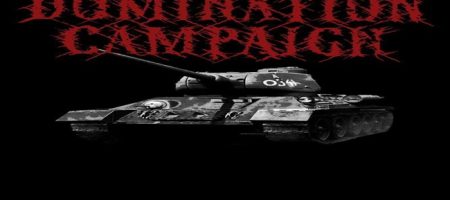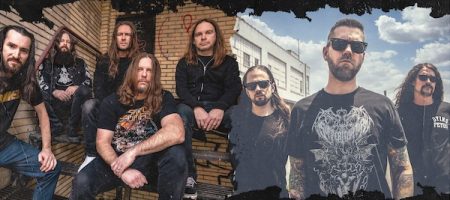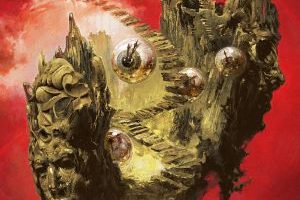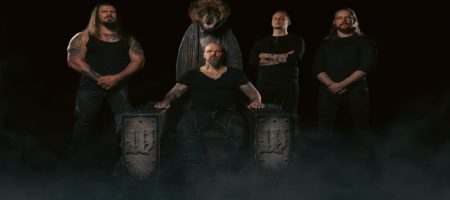Fallujah – Embracing Oblivion
Thursday, 25th August 2022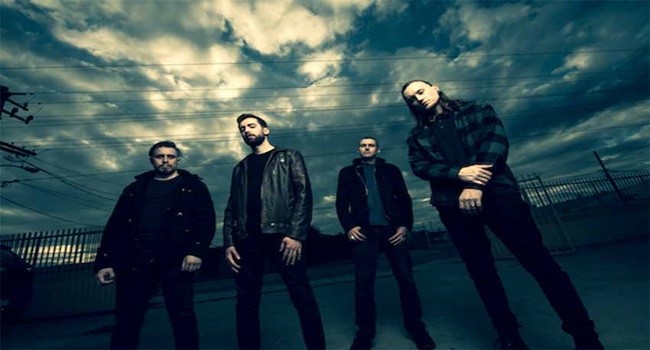
Masters at the progressive, atmospheric tech death arc in metal, Fallujah over the course of their career have been bringing their style to listeners far and wide, over many diverse platforms in the studio and on stage. It’s not very often that you hear of bands being able to tour with Devin Townsend, Between the Buried and Me, Killswitch Engage to Carnifex, Lorna Shore, and Rivers of Nihil while gaining new followers through each tour. Arriving at their fifth studio album with Empyrean, the changes in lineup have not sacrificed the intensity and development of their sound – mind blowing, aggressive, atmospheric in spots, enticing and intriguing as a collective.
We recently chatted with guitarist Scott Carstairs regarding the new record, the thought process behind the guest vocalists, the evolution of the band and the impact Dreamless had on their career arc, plus thoughts on using social media platforms to develop more fan engagement, his thoughts as a guitar teacher in today’s environment, plus hopes to crack new markets like Asia and South America with the new record.
Dead Rhetoric: In the last interview you did with Dead Rhetoric for Undying Light, you mentioned developing an album authentic to the band – uninfluenced by other bands and the trends going on. Do you see Empyrean as an extension of that outlook – and where do you see the new members Evan Brewer and Kyle Schaefer shaping things up for Fallujah that may differ from previous bandmates?
Scott Carstairs: I think with the last album, that was album number four, and I have been writing music for this band since the beginning. We wrote the first album being tech-death nerds that got obsessed with our local tech death scene, bands like Spawn of Possession and stuff like that, emulate those sounds. Eventually that brought us to mixing that sound with more atmospheric style qualities. For writing the second and third albums The Flesh Prevails and Dreamless, it was basically one giant session. Essentially, we finished off our first contract with our first record label by turning in our second album – and we immediately had to write a new album for the new label. We wrote the first album as younger dudes, and the second and third albums were written all the way through in a two- or three-year period. After that, I heard a lot of bands doing the same kind of style, taking the same concepts and executing them literally with riffs and atmospheric leads going over the top of them. I’m starting to see it be repetitive, and I already wrote two albums of this stuff. I had this feeling I needed to do something different with different concepts and different styles, try to execute them through our music.
For me Undying Light was really challenging. Instead of doing what’s natural to me, picking up my guitar and really going for it, I was really trying to change the way we structure music. A lot of different influences brought about certain riffs, and then things take over. With that last record, we wanted to go somewhere else, be atmospheric, hold back with different elements. With this album, I felt relieved after doing the fourth album. I wanted to do what came natural and take from the experience of the last album. Maybe some of the chord progressions and concepts that worked, bring that with this next record. But let’s make things as pissed off, dazzling, and complex as we can sound while still making things sound really clean. That was the main goal with Empyrean. It was a lot easier to write and a lot less challenging on the brain. It flows really well, sounds aggressive, it sounds more like the first three albums.
We are always going to stay true to ourselves, but at this point… like the last album, we weren’t even trying to be influenced by our own music. With this one, we were okay with some of these riffs resembling stuff from the earlier albums. The fans are enjoying that too – new riffs with these new feelings. For me it’s cool, I am executing ideas like when I was 17 when I was into Necrophagist or Deeds of Flesh when they were out of my playing range. To try these ideas now, make them more elegant, mature sounding, it’s pretty cool.
Evan and Kyle, they bring that maturity. Starting with Evan, that guy has been one of my favorite bass players since I can remember listening to death metal. He was at the very first death metal show I ever went to – his band Animosity was playing with Job for a Cowboy, From a Second Story Window, and Cattle Decapitation that was in 2006 or 2007. A long time ago. I followed that guy ever since, through his other bands and his solo projects, even his work on Entheos. The guy is one of the greatest bass players, ever. I happened to have an opportunity to get to know him through touring. Eventually when we needed a bass player I asked him, I sent him the demos to the music. He was super into this, he thought he could bring a lot to the table with this. Such an awesome experience to have him be able to send tracks back to me. It sounded so good; it was cool to see him… I have my own way of putting bass to guitar riffs, they try to outline their way. He was doing ideas that were completely different, rhythms I never would have even thought of, brings a funky groove to everything. It sounds so unique when you listen to it.
And then Kyle, he’s super creative. It seems like he has an endless flow of creativity. Anytime, we worked crazy hours as he has a full-time job. I had work on the musical part of the album, but whatever time we had to work, even if it was a Zoom call at midnight, we would get right to work to create lines, lyrics, work with concepts. The album wouldn’t sound the same without that guy. Probably because he’s had so much experience writing music, he has a band called Archaeologist and I did a guest solo for the band – that’s how I got to know them. He’s written twenty something EP’s, it’s proggy math rock. He is used to structuring songs and working through the puzzles for our music. Every single member had an outstanding performance, it’s pretty magical for me to watch. With some albums, people are in different places, this record everyone absolutely killed it.
Dead Rhetoric: Can you tell us about the specific guest musician choices you made for the album- and how you feel about the shapes and colors that they are able to add to these compositions?
Carstairs: Sure. There are not really any instrumental type guests on the record, and that was a conscious choice just to be the band making the music. With vocals, there is definitely… Kyle has an amazing range with the screams and the singing, the death metal growls, but we wanted to bring that super high octave atmosphere with Tori (Letzler) that was there on Dreamless, so we asked her to come back. We stayed friends ever since she did that record, so she was super stoked to do that. Another was bringing Katie (Thompson) back – I thought she was great on Dreamless but wasn’t showcased enough. We found a song where she got to be the center of attention, with this one we gave her parts that were huge, and she was the center. There were songs that Tori really liked them, but she said her vocal range didn’t fit within it. We tried it with Katie, and it sounded a lot better, she has a lower mid-range, almost more operatic. Where Tori has this high, yippee depressive kind of sound to it. You can use both, depending on what you need.
With Chaney (Crabb), I love Entheos, and the idea of representing Bay Area metal. We thought that would be a good addition to the sound. I was listening to the part and thought it would be a good section for a guest vocal part, it reminds me of Fredrick Throdendal’s Special Defects, who do I know that could do something cool like that? The first person I thought of was Chaney, she has that high up sound to her voice. That’s the same with David (Wu), he’s a Bay Area metal guy, long time friend and vocal instructor. He’s from the band Cyborg Octopus. Close friends that have been close to the band for a long time.
Dead Rhetoric: You chose to work with Peter Mohrbacher for the artwork again – who previously worked on 2016’s Dreamless for the band. What do you enjoy most about his work, and what you were able to achieve this time?
Carstairs: I just love atmospheric and how much depth is in this. The medium that he uses, it’s more like something that artificially emulates oil paintings. Every painting he has, it’s just so other worldly, you are looking at an alien looking character in an alien world, you could stare at that picture. It’s like what we are trying to do with the music, immerse the listener in a whole new world. You have to have a cover that puts them in that spot, we are not just sitting in a white room contemplating, we are in a whole other landscape right now. We are deep in something, I wanted to find an artist that would get that. We looked around for a little while, we had used Peter Mohrbacher for Dreamless, looking through his art – we found a piece that we wanted to use for Empyrean. We were all crossing our fingers, please let it be available. We had decided well before we asked him that this (piece) was the one. It matches how we all feel, the sound of this and all. I feel pretty lucky to have that as our cover.
Dead Rhetoric: Playing in a genre with intricate musicianship, dynamic shifts, and progressive maneuvers that crosses over various extreme metal platforms, how do you as an artist balance the line between technicality while developing cohesive arrangements that can be memorable and catchy from the listener perspective?
Carstairs: For sure, it took a really long time. I’ve been making this kind of music since I was probably fifteen or sixteen. We put out our first EP, which we don’t really share anymore, when I was sixteen. It was always the same – riffs and big, giant atmospheric parts, how can we mix them together? Now being thirty, it’s mostly based off feel but it’s like you have to listen to the song and feel the momentum, where is it at. Is the riff digestible? I’m always thinking of motifs, accents, where this section is intense may have a lot of accents, the following part we may have to relieve that with less chord changes. It’s small little ideas like that – how do we make sure the audience is still engaged without being fatigued. I’ve gotten better with making certain things a little sparser, making you want the riffs when they really come in. It took many years, there are times where with our fourth album where there were very little riffs, we fully pulled back in one direction. Albums where I can execute different ideas, what do we like on records when you are listening to it, driving in the car, the immersive experience – but what do I also like on stage? I’ve been thinking about that – you can’t have it be all proggy and atmospheric all the time, certain bands can get away with doing that. I want to have a live show that’s awesome, people to be moshing, headbanging, excited. You have to keep all these elements in mind and keep making things better.
With this album, I was into the idea of deleting certain parts and replacing them with other parts. I think that makes the music so much better. Making sure that every part is insane.
Dead Rhetoric: Has your vision for Fallujah and how far you want to take things changed from the start of the band as a teenager to the current status of the band now that you are in your early thirties?
Carstairs: Yeah, I guess so. When I was younger, I just wanted to be on the big stage with the big bands. I went and saw a lot of festivals; I was listening to a lot of records. My main goal was to make a great record that could stand next to those bands I looked up to and doing insane shows. I think the band has put out a lot of awesome records, this record is probably going to be my favorite. The band has also played a lot of great shows, Australia, Europe and America. My goals as an older person are a lot different. I want the band to have a stable career and have an impact on people, metal music and have its own voice. Not having to be dependent on a specific scene, I want the band to bring its own sound, its own voice, and own thing to the metal scene. To stand on its own and take the band to develop in further markets in other places. We’ve never been to Japan, we’ve never been to South America, I love Canada, Europe and all those places, but I want to expand further in the world. Just get better and have a band that can function on its own, strongly.
Dead Rhetoric: Being a guitar teacher, how have you handled the evolution of people learning the craft and the access to so much information online? What are specific traits or tools that you hope these players work upon that will be beneficial in the long run?
Carstairs: I’ve been teaching for ten years. There are definitely times where I feel like my playing has gone stagnant, and you have to take the time to be critical about what you do to be better. When you don’t have a private teacher… I’ve had many private teachers, and when I have that versus don’t, the pace is totally different. When you have a teacher, from an outside perspective critically just attack your weaknesses, and get you working on them immediately – when you are on your own, that’s a really hard thing to do. You develop all these ideas to work on your improvisational skills, and you set up your own regiment for that, but maybe that wasn’t the right thing to work on, maybe you needed to work more on your right-hand, left-hand skills.
The internet, all of these artists, most of them you have access to. If you want to emulate someone’s playing, there is someone out there on the internet that will teach you. Definitely take advantage of having a private teacher. It hurts for some people to hear it, as some people can’t afford private lessons. I definitely had to when I was younger take lessons on and off, saved up and buy a month worth of lessons with a guy, and come back later. Take advantage of having a community online. That’s another thing that is cool. Two years ago, I was teaching lessons the most, right when the pandemic started, all the tours got cancelled. I just taught lessons fully, figured out the internet fully, posted to YouTube, Instagram, pumped that up while we figure things out for the band. And then I got into doing Twitch, that’s another awesome place where you can go as an audience member. There are a lot of artists on Twitch, broadcasting themselves playing, and you can ask questions right there in the chat. That’s something I do, playing songs or music on Twitch, and someone will notice I pick like this, is there a reason for that? For me, it’s fun to say if you keep your fingers in as opposed to out, you get more accurate. Little tips like that.
Just really being engaged in the world of guitar. I do that with Twitch, you can do that with YouTube. I go watch artists and zoom in some pixelated image to figure parts out. I can’t tell you how many times I tried to figure out Decapitated solos from Vogg through a YouTube video. Use every resource, and don’t be afraid to get a private teacher.
Dead Rhetoric: Where do you see the major differences in terms of support and understanding between your initial time with Unique Leader Records and your current label Nuclear Blast?
Carstairs: The major difference to me would just be simply the reach. It’s a worldwide brand, as opposed to Unique Leader which is a small, American label that has respect around the world. I just knew we were jumping from our local thing, people from other countries would hear things on the internet as a niche thing to where we jumped on the world stage – through interviews, media stuff with them during the album cycles. The tours that we got on, the bands that we became associated with, it’s a huge difference. Now we are a small fish in a very big pond. Unique Leader, we took their resources and we started to outgrow it a little bit. We got brought onto Nuclear Blast, and it’s not just competing with our local bands, we have a standard now that has to be a certain quality to compete with the world. The performances need to be quality.
Dead Rhetoric: What would surprise people to learn about Scott Carstairs the person when he is away from his guitar and duties within Fallujah?
Carstairs: They would probably be surprised at how much guitar I do play. (laughs). I rarely don’t play guitar. It’s pretty much taken up most of my life. When they find out watching my Twitch, I do love anime. I watch anime more than any other kind of show. That’s about it. I play Zelda games every once in a while. The last two years though I’ve barely played any games or read any books. I watch something with my wife when I eat dinner, it’s just guitar world all the time. Rehearsing music to play on my Twitch channel, trying to practice something for a playthrough, doing something for Fallujah, that takes a lot of playing.
Dead Rhetoric: What do you consider some of the game changing moments in the band’s career – either specific songs, videos, albums, tours, or festival situations when you knew you were making a move up the ranks and a bigger impact in terms of your music?
Carstairs: I think the biggest moves were with our first record for Nuclear Blast when we dropped Dreamless. “The Void Alone”, people really liked that song, it took off and it became a staple of what we sound like. A mix of death metal riffs, female vocals, and sci-fi Vangelis/ Blade Runner element in the band. The feeling that people get. That record took us on tour with bands like Devin Townsend, Between the Buried and Me. That was a big moment, the prog world has seen us as a part of their world. We also got taken out with Killswitch Engage. We did a tour with Carnifex, Lorna Shore, Rings of Saturn, and in the middle of the tour we left, did a tour with Killswitch Engage in Australia, and finished that tour with Carnifex. Not only do we have an album people enjoyed, but we can play with these death metal bands, prog bands, Killswitch Engage, and the audience dig it. They didn’t boo us off the stage (laughs). It was sick. This is where we were making an impact.
Dead Rhetoric: What worries or concerns do you have regarding the world that we are living in today? What areas do you think the average person needs to take more consideration or work on to make things better for the global society as a whole?
Carstairs: From my experience I feel more confident after going through those two years. My whole life and my bandmates lives were based around touring. We always had a full schedule, we had that for the first ten years nearly. As our career kept going, we depended on quite a few tours, if we weren’t working on a record. We were in the middle of the fourth album touring cycle, we had these big plans, we had just finished some touring in Europe, feeling awesome. Even my guitar lessons were structured around this, everyone’s jobs too – Uber and stuff like that. It worked for us, and the pandemic happened. We had to adapt, some of that adapting led to us get new members. The old members tried new things with their lives, and it’s totally understandable.
During that time, we had to get good at accessing people through the internet. We had done that through Facebook and Instagram, but now Twitch and that good stuff. All the bands that figured that out, they really are benefiting from this. They have been able to play more, get access to new fans, stuff like that. Even if there isn’t a pandemic, I think it’s a huge, massive thing that people can do. Post content on Instagram, YouTube, wherever. Or maybe make a Twitch account and have your own version of broadcasting to people. The fans are really hungry for that kind of stuff, they want to know the band members, know what you are going through, they want to see the process of this.
On a world scale, without being super specific on literal issues, the best thing is to be positive and inspiring with people. My whole thing is getting on Twitch, a lot of people want to put people down, talk shit on bands, it can be a competition with the world. It’s always better if you are encouraging people, to work through your struggle. That’s what our record is about – pushing through struggle, rising out of the depths. Whatever you want to think of metaphorically. Good things come from that as opposed to being negative, not listening to people’s ideas, be open. It’s the easiest thing you can do.
Dead Rhetoric: How do you see the next year or so shaping up for Fallujah? What sort of things would you like to accomplish off the bucket list that maybe haven’t been achieved so far to date?
Carstairs: We’ve got this awesome North American co-headlining tour with Psycroptic. I am working on rehearsing for that. Then we’ve got a European tour. It’s pretty sick, we did our first North American tour with Rivers of Nihil after the pandemic and that was a huge relief. It’s crazy after all that. It will feel that way in Europe, there are so many things I miss about the people there. The next steps are going to places we haven’t gone to. I want to go to Japan, different parts of Asia and South America. I want to have another record that is very impactful to our fans, something that they really fall in love with. Hopefully we can do these goals that we want to do.











